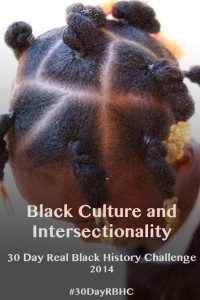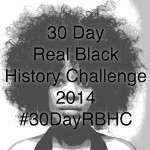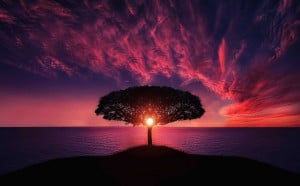Week two of the 30 Day Real Black History Challenge has been very inspirational to me personally. Exploring topics of culture and intersectionality, such as colorism, beauty, culture, the prison industrial complex, and even the relationship between African and Black. Power packed week full of topics to stretch our understanding of what culture is, and how that plays into privilege, the lack of privilege, intersectionality and ultimately…. spirituality. We are spiritual as a whole being, which includes our experiences within society; one of the very reasons this work is so important for us all.
Thank you for joining me once again. Here is the digest for week two!!
(Sorry if there are some formatting issues… I am still trying to iron them out but do not want to delay the digest any longer).
Day 8:
* Personal Reflections of Culture #5: I noticed that online there are often things that say “trigger warning” but I also notice that issues that are insensitive, disrespectful, and hurtful to Black people do not often have a trigger warning for readers. I read all kinds of things about slavery and racism, and it seems that there is often little consideration to those who would be triggered by that. I am not sure why that is… I mean, we are also triggered by our past trauma and our current traumas too…..
* No matter where you stand on the marijuana political debate, Michelle hits this hard from a systemic injustice place. The system built around this, from a racial caste system within the policies and laws of mass incarceration, is exceptionally slanted. And those who benefit on larger levels from this is as well. The reality is hard to grasp for some, but not for the rest of us.
Thank you to Michelle Alexander for always hitting us with truth, no matter how much it hurts.
* I found this poem the other day and saved it. It made me think, made me think of the categories that we label people in, and how we discredit them with otherwise simple words like “colored” or even “white”.
Written by an African child and nominated by The United Nations as the Best Poem of 2006.
“And you calling me colored??
When I born, I black.
When I grow up, I black.
When I go in sun, I black.
When I scared, I black.
When I sick, I black.
And when I die, I still black.
And you white people.
When you born, you pink.
When you grow up, you white.
When you go in sun, you red.
When you cold, you blue.
When you scared, you yellow.
When you sick, you green
And when you die, you grey…
And you calling me colored??”
* An incredible series called Hidden Colors is about to release it’s third installment. Part three continues to tackle race in America and it looks really good. I will be posting several things about these documentaries in the coming month (I plan to watch part one and two). In the meantime, check out this incredible clip/promo from the upcoming movie.
https://www.youtube.com/watch?v=56ZVoztD2yE
Day 9:
* Interesting little write up…. most interesting is the facts on the money part of perms and hair stuff for Black women. But I also adore the bits of humor in this lady’s writing.
“I know it all sounds ridiculous considering the black girl perm has been with us since the day that Garret A. Morgan’s Hair Refining Cream declared a war on “bad hair.” And considering that the perm itself has survived some pretty stiff hair trends including the Black is Beautiful movement of the 60s, which brought up braids and afros, and then the “Good Hair Revival” era of the Jheri Curl, which I always suspected was a part of COINTELPRO (after all, it was created by a white man). Perms even survived the god-awful wave nouveau curl phase of the early 90s.
If you don’t remember, this phase gave its wearers all the benefits of looking like a distant Debarge but without all the drip-drip, messiness of a seedy covert spying program aimed at destroying revolutionaries and progressive movements.
What I’m saying is that the perms reign was pretty solid. And I was for certain that despite Chris Rock’s best efforts to thwart its impact, women were going to hold tightly to that jar of Optimum Bodifying Relaxer much in the same way Charlton Heston warned that the only way you could take his gun was “from my cold, dead hands!” But with every good empire there must be a fall. And it seems that the perm’s time has come.”
* These facts show such alarmingly huge disparities in our justice system and the racial caste system that is thriving as a result. The reality is that African Americans are not using drugs or committing crimes more, they are just detained more. That should make everyone feel sick to the stomach.
Here are some of the incredible data….
-
Together, African American and Hispanics comprised 58% of all prisoners in 2008, even though African Americans and Hispanics make up approximately one quarter of the US population
-
According to Unlocking America, if African American and Hispanics were incarcerated at the same rates of whites, today’s prison and jail populations would decline by approximately 50%
-
One in six black men had been incarcerated as of 2001. If current trends continue, one in three black males born today can expect to spend time in prison during his lifetime
-
1 in 100 African American women are in prison
-
Nationwide, African-Americans represent 26% of juvenile arrests, 44% of youth who are detained, 46% of the youth who are judicially waived to criminal court, and 58% of the youth admitted to state prisons (Center on Juvenile and Criminal Justice).
-
Crime/drug arrest rates: African Americans represent 12% of monthly drug users, but comprise 32% of persons arrested for drug possession
http://www.naacp.org/pages/criminal-justice-fact-sheet
* Personal Reflections of Culture #6: Black culture is a complex system of interlocking pieces of broken cultures of others that we survived through and adapted to, and then passed down through the generations. It is one of the reasons it is almost impossible to explain our culture to others…. it is something known, not something we often have words for. One of the horrible things that has manifested within our culture, as a direct result of slavery and racism?
Colorism….. the inner cultural racism within our race against one another. I am a victim and a past perpetrator of colorism. Today I am almost always on the receiving end, as a child I was so confused about this.
One of the hardest things to cope with is the inner hate that we have learned, and then judge each other with it. Never Black enough, while some are too Black……. What is pretty? What is Black? What is worthy? Who is important? All questions that hang on the cultural balance of the hue of skin, inner and outer society. Devastating.
* Colorism is a devastating part of post-slavery thought process for Black people.
“My foster mother is a dark mocha brown with pretty straight white teeth, of which she explained she hated because the kids would pick on her as a child. She often told me how lucky I was to have light skin, it was this light skin that would afford me the opportunity to marry ‘a White man’ because Black men ‘ain’t shit’. I remember that point in time in which I vowed to never date a White man since I had already learned to distrust my mother’s advice; her motivations came from strange and unknown places.
My foster Dad, Big Jessie, was a mocha colored man, who was tall, charming, polite and easy going. My mother was a SAHM and I was a private school princess. It confused and hurt me to hear my mother speak so poorly about ‘Black men’ since I was sure my Dad was a Black man and he was beyond amazing (as I think many little girls think of their fathers).
Black men made up my Dad’s social circle, men who would show up to help lift and move furniture, to celebrate the holidays or to assist with fixing something around the house. Black men in the pictures on the walls, and in the Jet and Ebony magazine as they accomplished great things in civil life, entertainment, sports and business. Black men were men in general, until they weren’t.” #30DayRBHC
http://www.beyondblackwhite.com/light-skinned-side-of-colorism/
* There are no words to explain the pain in this issue for Black people, especially Black girls. It is one that is universally harmful within our community and with direct and obvious correlations to slavery. It is so very important to try and understand the impact of colorism in our community when trying to understand Black culture.
This video is very well done… I am still watching it and yet found it on youtube in parts. It is also on netflix.
Watch part one for a really great taste of this issue. If the first 4 minutes doesn’t break your heart… you are not listening close enough.
https://www.youtube.com/watch?v=AAmBIZBPeIE
* This seems to be part 2 of the Dark Girls documentary. So frustrating and hard to watch and conceptualize….. especially the part of the children picking out the pictures of lighter skin as “good”.
https://www.youtube.com/watch?v=FSfjUBg-INE
* This is everything that is wrong with our justice system…. and the way the law keeps us locked up instead of having the chance to rehabilitate. Disgusting.
http://m.myfoxal.com/#!/newsDetail/25699106
Day 10:
* Personal Reflections of Culture #6: So much of greater societal language is mirrored in symbolism that reinforces subconscious associations with black as bad, and white as good. This type of symbolic racism plays in the background, as aversively racist thought in our minds, acting as microaggressions against people of color. As a guy stated in the Dark Girls documentary….we were white to weddings and black to funerals.
Even within the Pagan community, we have adopted the shadow as the dark part of the process or person, and the part that people often fear or are uncomfortable with. The light half of the year that is about birth, newness and renewal, and the dark half of the year that is about going inward, death and survival. The integration of Jung’s shadow theory aligns us with the connection that the dark is not pleasant, and is often feared. In an article in Psychology Today states that the shadow “is the unknown ‘‘dark side’’ of our personality–-dark both because it tends to consist predominantly of the primitive, negative, socially or religiously depreciated human emotions and impulses like sexual lust, power strivings, selfishness, greed, envy, anger or rage, and due to its unenlightened nature, completely obscured from consciousness. Whatever we deem evil, inferior or unacceptable and deny in ourselves becomes part of the shadow, the counterpoint to what Jung called the persona or conscious ego personality.”
When everything that is black, or dark is associated with the things we want to hide, that we fear, or that are bad, we might get a glimpse into the continued programming that conditions our Black children to want to be something other than that.
* The challenge of defining Black Culture lies much in the broken history that lies in our past. Part of our individual right of passage is to find a place within the wholes of our ancestry to be one with who we are, and what that means. This is such a complex process, one that we all go through. Instead of having straight lines of lineage to pass down our secrets, we have to sift through the messages of society to determine what it means to be Black. What is Black Pride?
I also agree with the African American label too, but that will be for another post.
“That said, I think that the essence of “Blackness”, whether you’re in America or not, lies in that shared history of pain coming from slavery. That’s the common thread that binds all of us lost children in the Western Hemisphere. We’re lost because much of our history has been scrambled and/or lost by the slave trade, so much so that we might as well have sprouted randomly from American soil. Our ancestors lost their music, their gods, their dances, their food, their names—their identities were lost in the beatings, the killings, and the suicides that characterized those difficult times. In this oppressive alien land, Blacks as a people have had to reboot their culture from the ground up. Thus, when I think on Black Pride and try to define it in my own mind, this is where I start. I hesitate to use “African American”, for these very reasons. Yes, we’re of African descent and we never can nor should we ever deny that. However, we’re so disconnected from that root that to call ourselves African-Americans similar to the way in which others refer to themselves as Chinese-Americans, Indian-Americans, and Norwegian-Americans is disingenuous, as it pertains to our actual connection to anything in Africa. There is no “old country” for us. “
“Black Pride means first acknowledging and owning that slave ancestry, and very simply being proud that you managed to come out of that. It means remembering their struggle and honoring the values that they fought for. It means keeping in mind that, above all else, our forebears bled, suffered, and died for the opportunity to choose who we wanted to be, and be acknowledged as human. It means honoring our skin color, our typical common tracer (though not always obvious, as my own grandmother could’ve passed for a tanned white lady), and the rainbow of shades in which we can appear.”
http://nhuntwalker.blogspot.com/2013/09/defining-black-pride-for-self.html
* I loved this piece addressing the complexity of the relationship between African Americans/Black folk, and Africans. There is a huge cultural divide between those two cultures, and the average person may not understand that. I have heard people say to us to “go back to our country” but even though our lineage is in the soil of Africa, we are not from there. They do not accept us either.
The damage of slavery and conditioning estranged us from all types of acceptance, even from our own homeland. This piece addresses some very good points, including the ignorance of Africans who are not taught about slavery in school. They don’t call us Niggers, the Nigerians call us “akata”……. wild animal.
So when looking at systems of privilege and intersectionality, Black people in America are still fighting against stereotypes and prejudice within our America society, with the colorism inner Black culture and with our “skinfolk” from Africa who judge us as well. Wow…
*The beauty of our culture, and our struggle. James Brown put it in a song… right in the middle of a time when it mattered the most.
Regardless of how many times you have heard this song, listen again… listen to the lyrics and the power in his voice, look at the pictures of pride and struggle. Our resilience comes from the struggle.. we are a strong people.
https://www.youtube.com/watch?v=Y1VuORY9f-Y
* Public Enemy… Never afraid to talk about the hard stuff in their music, and show it in their videos. The video is great… and three of the best parts of this song (to me) are as follows…..
“But then again I got a story that’s harder than the hardcore
Cost of the holocaust, I’m talkin’ ’bout the one still goin’ on
I know where I’m from, not dum diddie dum
From the base motherland, the place of the drum”
“Now the story that I’m kickin’ is gory
Little Rock where they be dockin’ this boat
No hope, I’m shackled, oh plus, gang tackled
By the other hand swingin’ the rope “god damn”
Wearin’ red, white and blue, Jack and his crew
The guy’s authorized beat down for the brown
Man to the man, each one, so I teach one
Born to terrorize sisters and every brother
One love who said it, I know Whodini sang it
But the hater taught hate that’s why we gang bang it
Beware of the hand when it’s comin’ from the left
I ain’t trippin, just watch me step
Can’t truss it”
“Look here comes the judge, watch it here he come now
(Don’t sentence me judge, I ain’t did nothin’ to nobody)
I can only guess what’s happenin’
Years ago he woulda been the ship’s captain”
https://www.youtube.com/watch?v=am9BqZ6eA5c&feature=kp
Day 11:
* I am very proud to be Black. Black means so many things that are beautiful to me. The conflict between the use of the words Black and African American continue to cause intense debate inside of our culture, and yet we do not have a solution. I don’t know that we ever will completely agree… but it will continue to evolve I am sure. We were once just Niggers, and then we were Colored. We have since been Black and African American.
I think there is much to talk about in the use of the term African American, and how that implies a connection to Africa that the descendants of slaves do not often have. It is like an ideal that we do not know, and have never really known. Some try to find it….
But the reality is that we have Africans living in America that are African American, who are from Africa. Then we have Black people who are the descendants of slaves that were born in a land that we can never really claim, and yet we cannot really claim Africa either.
It is why I am Black. I do not reject African American, although I know some that do, but it is not my preference because it does not describe me, my ancestors journey, or my post slavery being. It does not show my history, it shows someone that I would have been if slavery was not a part of our past. But it was. And it is…..
“We are not African to any meaningful extent, but we are not white either – and that is much of why Jesse Jackson’s presentation of the term “African American” caught on so fast. It sets us apart from the mainstream. It carries an air of standing protest, a reminder that our ancestors were brought here against their will, that their descendants were treated like animals for centuries, and that we have come a long way since then.
But we need a way of sounding those notes with a term that, first, makes some sense and, second, does not insult the actual African Americans taking their place in our country. And our name must also celebrate our history here, in the only place that will ever be our home. To term ourselves as part “African” reinforces a sad implication: that our history is basically slave ships, plantations, lynching, fire hoses in Birmingham, and then South Central, and that we need to look back to Mother Africa to feel good about ourselves.”
http://www.manhattan-institute.org/html/_latimes-why_im_black.htm
* This video had me on my feet… screaming!! And the amazing thing is that it is not based in America, it is in South Africa. Yet….. YET…… the amazing disconnected, blinded perspective of the white woman in the conversation feels so much the same that I almost thought they were talking about us. The African woman kills it… she shoots out some things that I think that ALL WHITE people need to hear… because it is cultural!!! The amount of cognitive dissonance in place, the frame of thinking and Eurocentric values does not allow for what needs to be unpacked to change this race game. And then we see it manifest in these ways, all over the world, and the lines of harm that is created…..
In order to understand privilege, the impact of oppression on the oppressed AND the oppressor, this unpacking of cultural privilege and Eurocentric value structure needs to be done. And THAT is not going to be easy… and most people do not want to do that. It is looking into a mirror that will show NOT JUST one person’s individual choices…. but the choices and thought processes of a lineage that goes back years.
I STRONGLY recommend this video. Remember, they are not talking about America, but you could hardly tell that. Here is just one of the amazing things said, about half way through the 5 minute take…. amazing.
I want to do this work… with whoever is willing. I am willing.
“…And I would be interested in hearing how White people process the emotional baggage of what their ancestors did. I would be interested to try and understand what it did to white families. How much silence did white people have to cope with? How did white people build a shield around themselves to be able to deal with the system in which whiteness operated all these years. That is an emotional conversation…….”
* That last video left me needing a little freedom and equality love… so here ya go. The lyrics tell a story that should never be forgotten.
“The only thing that we did right, was the day we started to fight… keep your eyes on the prize. Hold on..”
https://www.youtube.com/watch?v=D_tcZAqQUAg
* Smokey kills it. He makes all the arguments for the reason I am Black, not an African American. Thank you Smokey… you legend you.
“And if one drop of Black blood makes you Black, as they say… then everyone is Black anyway. so quit trying to change my identity, I am already who I was meant to be.”
https://www.youtube.com/watch?v=GGWglJbfey4
* “Why we ain’t richer? Could it be… We still thinking like Niggas?”
KRS One and Dougie Fresh. If you don’t know nothing about that, you know nothin about hip hop. And KRS One is one deep lyricists… doing some poetry about the game we are really in.
Awesome!
https://www.youtube.com/watch?v=AgpX7KaZxo8
Day: 12
* Much of our legacies, our history, our stories… have been passed down from generation to generation. Our history was not the one that was written about, much of it lost even as we try to recover it today. And so I can relate on the idea that I learned to be who I am, a proud Black woman, from my mother.
Now that she is gone, I am doing what I can to hold onto the memories, and manifesting them into a living and breathing history for my children and their children. I am “still sitting here.. wanting memories to teach me how to see the beauty of the world through my own eyes”.
https://www.youtube.com/watch?v=vW2TpW4gCt8
* This is a very well done video clip that goes straight to the heart of aversive racism, unconscious biases around race and pathologizing people of color. Very clear, educational and insightful clip. They even hit on internalized racism and a little bit of framing it as appropriation of external racism within our internal frame. And not just about Black people… but people of ethnic color in general.
“That is the way structural Racism works… history matters”.
https://www.youtube.com/watch?v=F05HaArLV44
* Imagine that!!! We are in Day 12 of the 30 Day Real Black History Challenge 2014 and I have barely cracked into more of the academic studies stuff I have. Whew… we are a rollin….
* Not sure yet if the whole documentary is available but in this couple minute promo clip, there is some powerful stuff shared. Finally diving into what White Privilege is… and that it is systemic. It is the concept of whiteness that is engrained into people, framing it in a way that is often invisible. I really look forward to more things like this…. instead of fighting against a concept that privilege applies, really doing the work to understand it within the white culture, how that impacts people of color, and how it is systemic and within the institutions we have here in our country.
https://www.youtube.com/watch?v=OMEaEdsTb0Y
* There are some incredible theories, researchers, psychologists and social scientists doing work around the historical trauma of Black people, and of the Native people. This Master’s project around exploring the approach to transgenerational trauma is packed with some insightful observations, questions and conclusions. And dedicating this to his daughter humbled me… “This work is dedicated to my most beautiful, “sunshine girl,” deceased daughter Taisha Shana Dawson (MABP), who was a victim of Historical Trauma, raped at the age of 6, then again in the army in her 20s and had all her fill of this mad world and committed suicide at the age of 26.”
“…Then I Lost My Spirit”: An Analytic Essay on Transgenerational Trauma Theory as Applied To Oppressed People of Color Nations
“The Mass Trauma Events of genocide and slavery created a Trauma Response, Unresolved Grief and Historical Trauma and Post Traumatic Slave Syndrome, which have not been redressed, in the tradition of other crimes against humanity.Disenfranchised grief, coupled with cultural disenfranchisement, prevented the two nations from healing and current negative health indices are attributed to this historical relationship.Denial of the consequence of historical trauma from genocide and slavery by the government renders all health initiatives directed towards oppressed nations limited at best, including cultural competency, substance abuse treatment and Healthy People 2010.The primacy of the subordinate character of the oppressed nations to the American state and the associated inferior health policies are inescapable. The use of Historical Trauma theory would revolutionize social work and all human service industries. Given the political nature of the problem, and its relationship to the original anti-social contract, its solution will require a heighten human rights based social work profession.”
* This artist’s name is Black Ice. I cannot even describe this two minute spoken word…. except with the word truth; the name of this piece is “truth is”. It is impossible to change what is misunderstood, or to question when you cannot see the larger picture.
He hits the youth culture within hip hop, and the pain, the hustle, the culture, the conditioning… the system…. and how we get here.
Listen…. it is two minutes long and everyone could learn something. I am still speechless.
“See, America makes you an opportunist, and at the same time they institutionalize you. So the fact that Niggas get these big record deals, big money and then go to jail shouldn’t surprise you. That’s what lies do. And most of these guys DO have raw talent, just infantile education. So the business feeds them all the weed, and ecstasy, and a little bit of paper to provide some pacification….. from all the bullshit frustration they serve you. “
https://www.youtube.com/watch?v=kF-l8eT3Vrs
Day 13:
* “Nobody in history has ever gotten their freedom by appealing to the moral sense of those who were oppressing them.” – Assata Shakur
Such beautiful poetry from one of the most incredible voices and stories; Assata Shakur. Labeled a criminal, a domestic terrorist, in the United States, she is not that at all. Put on the FBI’s most wanted list 30 years after the crimes, she was (in my opinion) a prisoner of the war on Black people, specifically the war on the Black Panthers. Here is an insightful look into her spirit, and the words she speaks to her mother.
“To my momma,
who has swalled the amerikan dream
and choked on it.
To my momma,
whose dreams have fought each other –
and died.
Who sees,
but cannot bear to see.
A volcano eating its own lava.
To my momma, who couldn’t turn
hell into paradise
and blamed herself.
Who has always seen reflected in her mirror
an ugly duckling.
To my momma,
who makes no demands of anyone
cause she don’t think she can afford to.
Who thinks her money talks
louder than her womanhood.
To my butchfem momma,
who has always
taken care of business.
Who has never drifted
hazily to sleep
thinking, “he will take care of it.”
Who has schemed so much
she sometimes schemes against herself.
To my sweet, shy momma.
Who is uneasy with people
cause she don’t know how
to be phony,
and is afraid to be real.
Who has longed for sculptured gardens.
Whose potted plant
dies slowly on the window sill.
We have all been infected
with a sickness
that can be traced back
to the auction block.
You must not feel guilty
for what has been done to us.
Only the strong go crazy.
The weak just go along.
And what i thought was cruelty,
I understand was fear
that hands, stronger than yours,
and whiter than yours,
would strangle my young life
into oblivion.
Momma, i am proud of you.
I look at you
and see the strength of our people.
I have seen you struggle
in the dark;
the world beating on your back,
dragging your catch
back to our den.
Pulling your pots and pans out
to cook it.
A mob in one hand.
A pencil in the other,
marking up my homework
with your love.
The injured have no blame.
Let it fall on those who injure.
Leave the past behind
where it belongs–
and come with me
toward tomorrow.
I love you mommy
cause you are beautiful
and i am life that springs from you:
part tree, part weed, part flower.
My roots run deep.
I have been nourished well.”
* With the disparities in the criminal justice system that are being explore, and while thinking on some of the stats we have looked at this month so far around the racial caste system in the prison industrial complex….. What happens to the children who are the victims of mass incarceration? What happens to the young men who grow up without a father, or subjected to the cruelty of institutional racism by having his father (or mother) be a part of the modern day Jim Crow system we have in place within this country? Heartbreaking questions with heartbreaking answers.
Anyone who knows me knows I love some Daniel Beaty. And this one is my favorite… I post it several times a year. But I will keep posting it. It is one of the most powerful videos I have ever watched. and I first saw it in a transgenerational/historical trauma and oppression workshop in Oakland. I cried when I watched it then. I cry when I watch in now.
If you have seen it before, watch it again, and think about the worldview of the children who are victim to this system.
https://www.youtube.com/watch?v=9eYH0AFx6yI
* The Rose that Grew From Concrete by Tupac Shakur
Did you hear about the rose that grew from a crack in the concrete?
Proving nature’s law is wrong it learned to walk without having feet.
Funny it seems, but by keeping it’s dreams, it learned to breathe fresh air.
Long live the rose that grew from concrete when no one else ever cared.
* Personal Reflections of Culture #7: The WAR on racism, the WAR on crime, the WAR on drugs, the WAR on poverty…. I know that a lot of people of color are tired of being at war. We are a battle torn community that suffers the after-effects of a war that never ends, we are always on the battlefield trying to figure out what is next, who is next, and what to do next. We have been at war for hundreds of years, and it feels exactly like that…. we are still at war.
Here is what I often think about…. when everything sounds like, looks like, feels like… and is referenced as a war, with people of color clearly on one side of the line, then why is it not expected that we would react as if we are at war? I mean… we are hypervigilant, worried about protection, scared, often manifesting defensiveness, potential aggression, fear tactics, fight and flight, contemplating mortality….. it is a large part of our historical and present culture.
We can see this with soldiers but we (as a society) cannot see this with Black people. It is as clear…. and plain as day for me to see.
Day 14:
Lauryn Hill… doing spoken word? Is there anything more to say?
https://www.youtube.com/watch?v=kntNPyThiH0
* Reverse racism is a topic that I could go on and on about. The misunderstanding of what racism is, and then the assumptions that are made based on that. And to top that off… why do we call it reverse racism anyway? As if White on Black racism is the norm and when a Black person turns that, then it is reverse…?
We here in America should really pay attention to the words we use… we are already framing our language to illustrate that racism is not Black to White but then want to claim the power of the word racism when people with no power are angry with those who are a part of the group that oppressed them. Kind of confusing, isn’t it? It should be because it doesn’t make sense. The reality is that racism is prejudice plus power. Prejudice without power is ugly but it does not have the impact to harm mass amounts of people from a racial group like racism does.
Like Dr. Joy DeGruy says… a Black person can hate a White person all day long… but when they walk into the bank, they still get the loan.
“Before I sat down to write this article, I thought about how one of my co-workers, who is African-American, would be perceived if she wrote this article. Undoubtedly, she’d be called a “racist.” To me, that’s a clear indication that our society still needs to confront the stereotypes and history that surrounds us.”
* One drop rule… something that we culturally understand and yet others stuggle with. A friend referred to me lovingly this past weekend as biracial and it made me smile because as a child I wanted to be biracial. But I am not. I wanted to be exotic, a mixture… but I am just a black girl with two black parents. So in response I said I wasn’t biracial, I am Black.
This article talks a little bit about how blackness has been defined within society and therefore transferred to cultural definitions. Interesting how that happens….
“To be considered black in the United States not even half of one’s ancestry must be African black. But will one-fourth do, or one-eighth, or less? The nation’s answer to the question ‘Who is black?” has long been that a black is any person with any known African black ancestry. This definition reflects the long experience with slavery and later with Jim Crow segregation. In the South it became known as the “one-drop rule,” meaning that a single drop of “black blood” makes a person a black. It is also known as the “one black ancestor rule,” some courts have called it the “traceable amount rule,” and anthropologists call it the “hypo-descent rule,” meaning that racially mixed persons are assigned the status of the subordinate group. This definition emerged from the American South to become the nation’s definition, generally accepted by whites and blacks. Blacks had no other choice. As we shall see, this American cultural definition of blacks is taken for granted as readily by judges, affirmative action officers, and black protesters as it is by Ku Klux Klansmen.”
http://www.pbs.org/wgbh/pages/frontline/shows/jefferson/mixed/onedrop.html

















